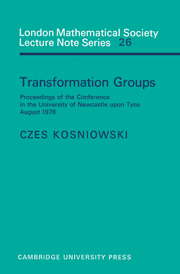 Transformation Groups
Transformation Groups Book contents
- Frontmatter
- Contents
- PREFACE
- PART ONE
- PART TWO (SUMMARIES AND SURVEYS)
- Proper transformation groups
- Problems on group actions on Q manifolds
- A non-abelian view of abelian varieties
- Non compact Lie groups of transformation and invariant operator measures on homogeneous spaces in Hilbert space
- Approximation of simplicial G-maps by equivariantly non degenerate maps
- Equivariant Riemann-Roch type theorems and related topics
- Knots and diffeomorphisms
- Some remarks on free differentiable involutions on homotopy spheres
- Compact transitive isometry spaces
A non-abelian view of abelian varieties
Published online by Cambridge University Press: 05 March 2012
- Frontmatter
- Contents
- PREFACE
- PART ONE
- PART TWO (SUMMARIES AND SURVEYS)
- Proper transformation groups
- Problems on group actions on Q manifolds
- A non-abelian view of abelian varieties
- Non compact Lie groups of transformation and invariant operator measures on homogeneous spaces in Hilbert space
- Approximation of simplicial G-maps by equivariantly non degenerate maps
- Equivariant Riemann-Roch type theorems and related topics
- Knots and diffeomorphisms
- Some remarks on free differentiable involutions on homotopy spheres
- Compact transitive isometry spaces
Summary
INTRODUCTION
The role of nilpotent groups, particularly the Heisenberg group, in the theory of Theta functions and Abelian varieties has been implicitly known for some time and made explicit by Weil and Mumford. In this paper we will describe a way of naturally attaching a rational nilpotent Lie group N(T) and an automorphism J of N(T) to a complex torus T. In terms of the morphism properties of the pair (N(T),J) and certain homogeneous spaces of N(T), we will be able to:
Give a necessary and sufficient condition for T to be an abelian variety.
If T is an abelian variety, fully describe the field of meromorphic functions of the variety.
In order to make the presentation as striking as possible we will develop the theory without mentioning meromorphic functions, line bundles or theta functions. At the end of the paper we will relate the objects used by us to the classical ones.
THE RATIONAL NILPOTENT LIE ALGEBRA OF CERTAIN MANIFOLDS.
Since our first construction is of some independent interest we will present it in a general setting and later see how to specialize it to the cases of particular interest to us.
Let M be a manifold. Let H*(M,R) be its real cohomology algebra and let H+(M) be the algebra of elements of positive degree. Clearly H+(M) is a nil-associative algebra as the product of m elements, m > dim M, is zero.
- Type
- Chapter
- Information
- Transformation GroupsProceedings of the Conference in the University of Newcastle upon Tyne, August 1976, pp. 259 - 266Publisher: Cambridge University PressPrint publication year: 1977


